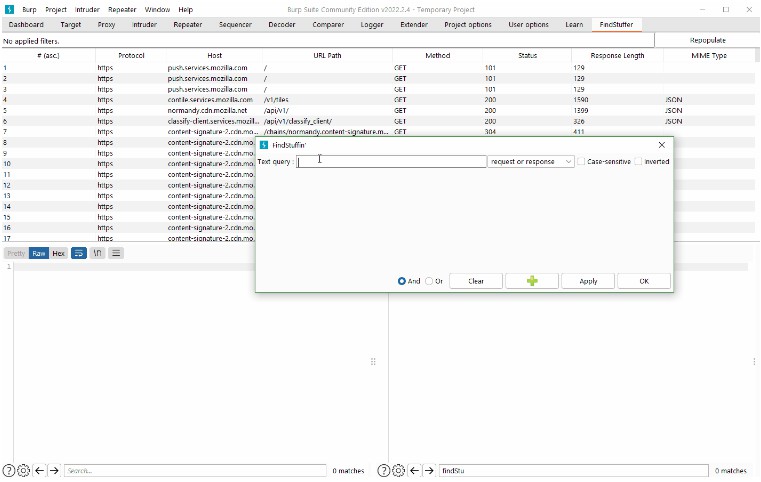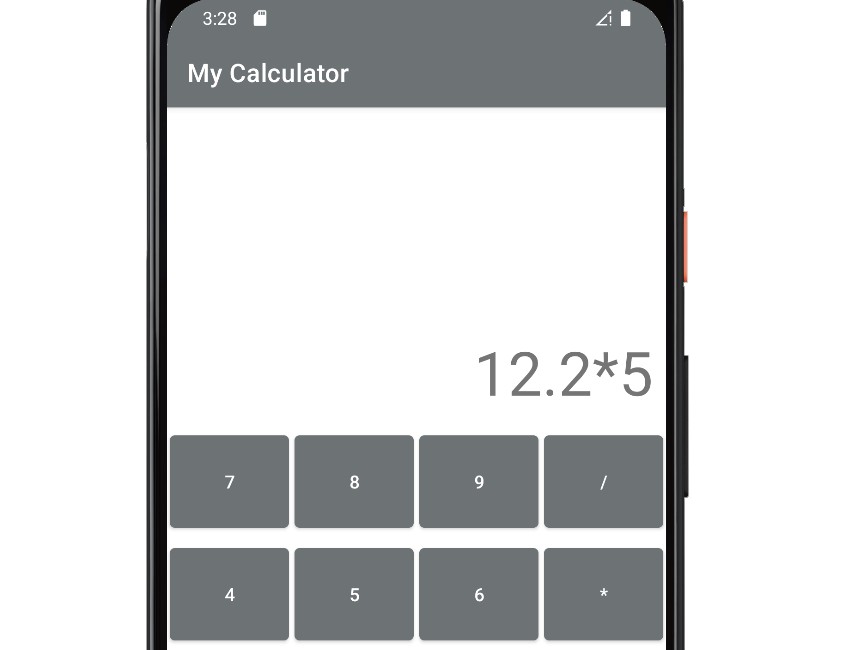FindStuffer
FindStuffer, a Burp extension to find stuff, both for Community and Pro versions.
You can use FindStuffer to aggregate as many text queries as needed in one search (in theory). Each query can be individually :
- Inverted
- Applied to a specific scope (request, response, both at the same time, or any)
- Configured to be case-sensitive or case-insensitive
Query aggregation can be and-based or or-based.
Check out the tutorial for a detailed example.
Tutorial / Demo
In this section I will give an example of how to use FindStuffer v0.0.1. This is not the most recent version but the tutorial is still valid.
Populating with HTTP traffic
First of all, make sure FindStuffer is loaded into your extender

Then, generate some HTTP traffic. In this example, traffic has been generated by visiting Google and Github with Firefox, as can be seen in Burp’s native proxy tab:

However, since FindStuffer does not implement any proxy / HTTP listening at the moment, it didn’t get any of that traffic. The “Repopulate” button fetches the current HTTP history entries made available through Burp’s Extender API and resets FindStuffer’s history table based on said entries.
FindStuffin’
For this demo’s purposes, let’s say you want to find the items meeting all of the following criteria:
- Request made to the
www.google.comhost - (AND) HTTP response containing the
Serverheader - (AND) The
Serverheader’s value is notgws
Note that :
- The search bar’s text changes to reflect the executed search.
- The search is executed both on the headers and the body. It is executed on any thing that can be shown in the request & response editors.
- It is possible to add as many fields as possible (theoretically).
- This demo only showed AND-based aggregation. The radio buttons in the bottom of the search dialog allow you to choose between AND-based and OR-based query aggregation.
- Changes made to a text field or a checkbox / radio button in the search dialog won’t take effect if “OK” isn’t used. Simply closing the search dialog will make the search dialog revert to its previous state (with the exception of keeping the added text fields).
- An empty text field (with no whitespace) is ignored.
Installation
At this moment, you need to import manually a JAR to your Burp from Extender → Extensions → Add. You can compile this code to create the JAR or you can use the one in this project’s releases page.
Contributing
If you like the extension and the potential it has to be a practical tool you use often, you are very welcome to contribute to this repo. You can contribute either by giving feedback, requesting features, reporting bugs, or picking an idea from this README / from Github issues and making a pull request.
Dev & debug env setup
TODO : update this with more details if someone actually wants to dev
You need to add burp’s JAR as an external library in your IDE’s project, and then you use that main function I left in the BurpExtender class to launch Burp from inside the IDE. After that you’ll be able to see the stacktraces, set breakpoints, etc.
Possible improvements
This section is about features that are could be useful but are not considered yet for developments in the near future. Features that are being currently worked on are in Github’s issues.
Unclumsify UI code
Several Java Swing interfaces were not correctly used in this code, mainly due to the my ignorance when it comes to UI and Java Swing. It is possible that code is very clumsy and that it reimplemented stuff it shouldn’t have. But it seemed easier to implement my own sorting / filtering than to learn Swing’s seemingly complicated interface, especially in the beginning when I didn’t know how to debug the extension in my IDE and didn’t have access to any error messages, just failures.
It might be worth it to revisit these parts and make them more “standard” to make contributions easier.
Listeners
It would be nice if the extension registers a proxy or HTTP listener to refresh the tables entires automatically as new HTTP traffic is generated. This however must:
- be thread-safe
- take into account existing sorting and filtering
- be memory-efficient A clever implementation of this could take some serious amount of work.
Global negative search
Besides the negative query option available for each individual text field, implement the possibility of inverting the whole search. This is not really essential because the currently implemented filters allow to do equivalent searches (De Morgan’s laws). But still, could be nice.
Columns
Choose which columns can be displayed / hidden. Modify their order. Also add more types of columns (e.g. mime types).
Non-textual queries
This is not the aim of this extension, but might as well make it more practical.
Improve UI and UX
This is really not my area and I hate it. But my extension is indeed kinda ugly.





